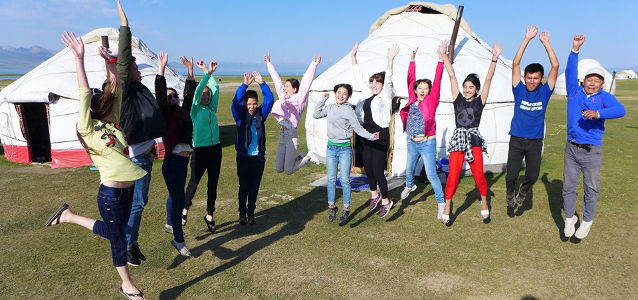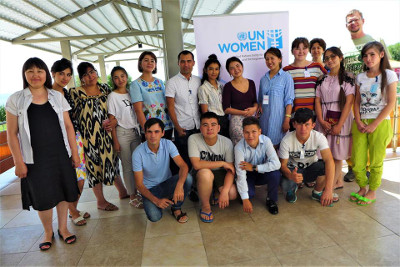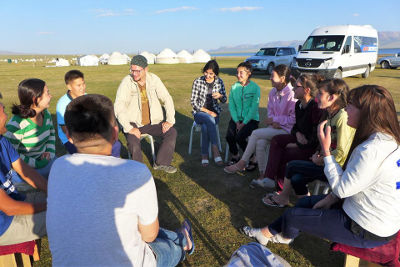Kyrgyz and Tajik youth work together for peace and gender equality
After training at a summer camp, youth activists get busy promoting sustainable development, gender equality, natural resources management and peace on the Kyrgyzstan-Tajikistan borderDate:

Following a UN Women organized summer training camp, Kyrgyz and Tajik youth have begun work to fight domestic violence and promote peace, gender equality, media literacy and the rational use of water to their communities on the Kyrgyzstan-Tajikistan bordering communities.
Expected to reach up to 4,500 people in border communities between now and December 2018, the UN Women-trained youths’ work includes working sessions with border communities and university students to increase awareness of the Sustainable Development Goals (SDGs) – especially SDG 5 (Gender Equality), SDG 6 (Clean Water and Sanitation) and SDG 10 (Reduced Inequality) – and forum theatres to promote dialogue and educate communities on gender inequality, domestic violence and the rational use of water.
“I’m very happy I attended the camp. I learned how to promote gender equality and responsible management and sharing of resources – and made new friends from Kyrgyzstan and Tajikistan with who I look forward to doing many useful projects and events together,” said Kaniet Jamilova, from Kyrgyzstan’s southwestern Batken province.

Camp participants will also conduct media literacy sessions to strengthen critical thinking and show communities how to verify social media information, and will engage in joint local activities in support of UN Security Council Resolution (UNSCR) 2250 on Youth, Peace and Security and UNSCR 1325 on Women, Peace and Security.
“Thanks to this camp, I made Tajiki friends and learned media literacy and how to prepare multimedia products that will help promote gender equality and fight domestic violence in our countries,” said camp participant Talant Shamshiev from Batken province, Kyrgyzstan.
Participants set up the Facebook network Youth for Peace to better coordinate activities and share news on current and planned advocacy actions and campaigns.
“I’m am very much looking forward to implementing joint activities with my Tajik and Kyrgyz friends,” said participant Munira Akhmedova, from Sughd Province in northwestern Tajikistan.
Held 22-28 July on the shores Lake Issyk-Kul, the Youth and Environmental Sustainability Summer Camp trained 20 cross-border Tajik and Kyrgyz youth activists in advocacy work to promote sustainable development, gender equality, natural resources management, peace and security and media literacy.

Participants learned innovative media tools, video production, and how to organise forum theatres on gender inequality and domestic violence, reveal fake news and media literacy, youth and peacebuilding, conduct a series of advocacy actions on promoting gender equality, access to natural resources, inclusive and efficient natural resources management processes.
The conflict along the Kyrgyzstan and Tajikistan border have devastating consequences and often exacerbate gender inequality between women and men. Using gender-based approaches is critical in peace-building and building gender-equality.
The Youth and Environmental Sustainability Summer Camp was initiated by UN Women ECA in support of the UN Peacebuilding Fund-funded Cross-border Cooperation for Sustainable Peace and Development, implemented in partnership with other UN agencies - FAO, UNDP, UNICEF and WFP on both Kyrgyzstan and Tajikistan sides. Project outreach covers six clusters of cross-border villages with high and medium conflict potential in border areas of Tajikistan and Kyrgyzstan. The project aims at building sustainable mechanism to reduce the risks of violent conflict and to create a more conducive environment for the promotion of sustainable peace and development in cross-border areas. The summer camp was organized in partnership with the Representative Office of the International Foundation for Electoral Systems (IFES) in the Kyrgyz Republic with support from the United States Agency for International Development (USAID).